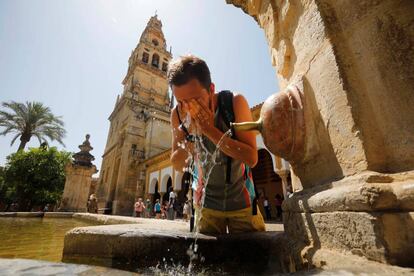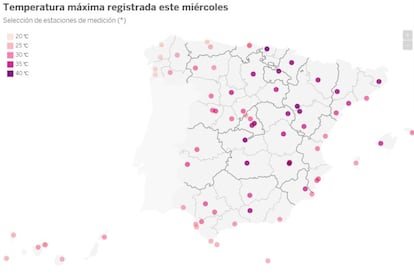Heatwave in Spain claims two lives
A 17-year-old and an elderly man have died from heatstroke, while a firefighter and a farmer have also been hospitalized as the extreme weather conditions intensify across the country

Two people have died from heatstroke in Spain and two more have been hospitalized as the country grapples with a record-breaking heatwave.
A 17-year-old man died in the early hours of Friday morning in a hospital in Córdoba, in the southern Spanish region of Andalusia, after being admitted for heatstroke, according to the regional health department. The man was working in a field when he began to feel dizzy. He jumped into the pool on the rural property to cool down but when he got out he began to suffer convulsions. The 17-year-old, who lived in the Castro del Río village, was taken to the Reina Sofía Hospital in Córdoba at midday on Thursday and died at 1.25am on Friday after CPR failed to revive him. He is the first person to die as a result of a heatwave in Andalusia this year. In 2018, there were no victims recorded in the region.
Seven Spanish provinces have been put on red alert for extreme risk
Spain’s AEMET weather agency has put Córdoba on an orange alert on Friday with temperatures expected to rise above 41ºC. This level of weather warning denotes “unusual phenomena and with a certain level of danger for usual activities,” with warnings to the public to be aware of advice from the authorities.
On Thursday, an 80-year-old man died from a possible case of heatstroke in Valladolid, in the northeastern Castilla y León region. The elderly man died a little before 5.50pm at a street intersection in the city. Emergency services rushed to the spot but when they arrived he had already passed away.
Meanwhile, a 45-year-old farmer has been admitted in a serious condition with heatstroke symptoms in the intensive care unit of a hospital in Murcia in southeastern Spain, and a firefighter from the Catalan Fire Department has also been taken to hospital after suffering from heatstroke while fighting the wildfire in La Ribera d’Ebre in Tarragona.
Heatwave intensifies
The heatwave is expected to peak on Friday, with the high temperatures forecast to remain until Monday. According to AEMET, the maximum temperatures will rise by up to 3ºC on Friday in the southeast of the peninsula and in the Mediterranean region. Seven Spanish provinces – Huesca, Zaragoza, Barcelona, Girona, Lleida, Navarre and La Rioja– have been put on red alert, which denotes extreme risk with phenomena that bring a very high risk for citizens in general. People living in these areas are advised to avoid leaving the house when the sun is at its hottest. Another 19 provinces are on orange alert.

AEMET has described the current heatwave as extremely unusual for the month of June. Since the weather event began on Wednesday, many areas have seen the hottest temperatures ever recorded for this month. On Wednesday, the airport in Bilbao, in the northern Basque Country region, recorded 39.6ºC, the highest temperature in 30 years. The towns Molina de Aragón in Guadalajara province and Daroca in Zaragoza recorded their hottest temperature for June since records began, reaching 36.1ºC and 39.1ºC, respectively.
What‘s more, the night is bringing little relief from the heat with most of the country trying to sleep when it is over 20ºC. Many monitoring stations in the country have recorded their highest minimum temperatures for the month including Palma (26.3ºC), Cuenca (24ºC), Logroño airport (21.5ºC), Segovia (23.8ºC) and Teruel (22.8ºC).
English version by Melissa Kitson.
Tu suscripción se está usando en otro dispositivo
¿Quieres añadir otro usuario a tu suscripción?
Si continúas leyendo en este dispositivo, no se podrá leer en el otro.
FlechaTu suscripción se está usando en otro dispositivo y solo puedes acceder a EL PAÍS desde un dispositivo a la vez.
Si quieres compartir tu cuenta, cambia tu suscripción a la modalidad Premium, así podrás añadir otro usuario. Cada uno accederá con su propia cuenta de email, lo que os permitirá personalizar vuestra experiencia en EL PAÍS.
¿Tienes una suscripción de empresa? Accede aquí para contratar más cuentas.
En el caso de no saber quién está usando tu cuenta, te recomendamos cambiar tu contraseña aquí.
Si decides continuar compartiendo tu cuenta, este mensaje se mostrará en tu dispositivo y en el de la otra persona que está usando tu cuenta de forma indefinida, afectando a tu experiencia de lectura. Puedes consultar aquí los términos y condiciones de la suscripción digital.








































